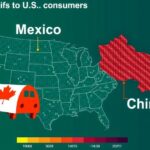Impact of Trump’s Tariffs on Canada, Mexico, and China: Key Implications
President Trump has enacted tariffs on imports from Canada, Mexico, and China, prompting retaliatory tariffs from Canada and Mexico and potential countermeasures from China. These measures may significantly raise consumer prices in key sectors such as automotive, energy, and agriculture, complicating trade relations within North America and risking further escalation of trade wars.
President Donald Trump has enacted tariffs on imports from Canada, Mexico, and China, starting on a recent Tuesday. The immediate impact saw Canada and Mexico respond with their own retaliatory tariffs, while China announced potential countermeasures. As of 2023, trade between the U.S. and its North American neighbors amounts to $1.8 trillion, overshadowing the $643 billion exchanged with China, further complicating the trade landscape.
The tariffs comprise a 10% duty on all Chinese imports and a 25% tariff on those from Canada and Mexico, with Canadian energy imports being taxed at the lower rate of 10%. Such levies are expected to affect various imported goods quickly, particularly in the automotive and agriculture sectors. For instance, the automotive industry has deep-rooted supply chains across North America, meaning these tariffs could disrupt pricing structures significantly.
One vital industry at risk is automotive manufacturing, which relies heavily on components from both Canada and Mexico. In 2023, the U.S. imported $69 billion in vehicles from Mexico and $37 billion from Canada. Analysts, including Scott Lincicome, express concern that these tariffs could result in price increases of approximately $3,000 per vehicle, impacting consumers as car prices already hover around $50,000.
Canada serves as the primary supplier of crude oil to the United States, with significant quantities shipped throughout the year. Lincicome indicates that due to the complexity of refineries’ processing capabilities, tariffs on Canadian oil are likely to translate into higher gasoline prices at the pump, estimating hikes of 30 to 70 cents per gallon.
The beverage industry may also face increased prices due to tariffs on spirits. In 2023, the U.S. imported $4.6 billion in tequila and $108 million in mezcal from Mexico, along with $537 million from Canada, predominantly in whisky. Chris Swonger of the Distilled Spirits Council warns that while aiming to protect U.S. jobs, imposing tariffs could ultimately harm consumers and lead to further job losses in the hospitality sector.
Higher food prices may be on the horizon for American households as tariffs threaten agricultural imports from Mexico, including essential vegetables and fruits. The potential for a 25% increase in prices could strain grocery stores already operating on slim margins. Lincicome notes the significant reliance on Mexican products, particularly avocados, which may experience price hikes just prior to major events like the Super Bowl.
American farmers are also apprehensive that Canada and Mexico may retaliate against U.S. exports, reminiscent of earlier trade conflicts. During the previous Trump administration, retaliatory tariffs notably affected rural American communities, triggering sharp declines in soybean and corn exports. While some farmers felt relief from government assistance after these losses, many prefer to receive income through market sales rather than federal support.
In 2023, President Trump’s administration imposed tariffs as part of a broader trade strategy targeting imports from Canada, Mexico, and China, driven by concerns about trade imbalances. These tariffs come at a time when trade relations are already fraught, particularly between the U.S. and its North American neighbors, where cross-border trade relationships are deeply integrated across various sectors, particularly automotive and agriculture.
In summary, the tariffs introduced by President Trump are poised to have immediate and wide-ranging effects across multiple industries, particularly automobiles, energy, beverages, and agriculture. With retaliatory measures anticipated from Canada and Mexico, consumers may face higher prices on essential goods. This unfolding situation exemplifies the complexities of modern trade relations and the potential for economic repercussions that could affect both industries and consumers alike.
Original Source: apnews.com








Post Comment